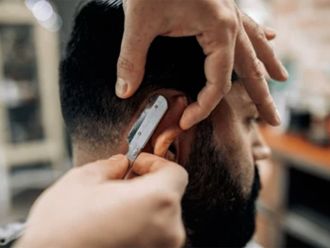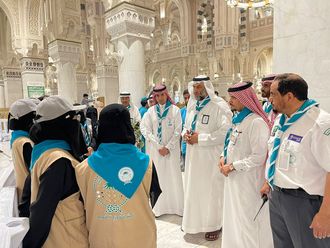Manama: A Kuwaiti MP has called for the expulsion of the Iranian ambassador and cancellation of bilateral accords in retaliation for the Revolutionary Guards’ spy cell meant to provide Tehran with information on US and Kuwaiti military sites in the northern Arabian Gulf country.
“We are shocked by the silence of the Kuwaiti government, especially that this is not the first time that an Iranian cell is busted,” MP Mohammad Al Hayef said.
“We must cancel our agreements with Iran, recall our ambassador in Tehran and expel the Iranian ambassador in Kuwait. Confronting those who seek to undermine Kuwait’s security requires bold and historic positions that are not shaped by diplomacy or pressure. If no decisive action is taken against those targeting national security and stability, then we have an unacceptable monumental government failure and an intolerable political fiasco,” the MP was quoted as saying by Kuwaiti daily Al Watan.
Thawbat Al Umma parliamentary bloc said in a statement that the government needed to assume its responsibilities by adopting bold political and security stances towards Iran.
MP Waleed Al Tabtabai said that the busting of the cell “confirmed suspicions about the existence of Iranian threats to Kuwait and the other Gulf countries.”
Hussain Al Gallaf, however, said that he had expected the interception of sleeping cells for Al Qaeda or Taliban.”
Coverage of the cell busting dominated the news in most newspapers on Sunday amid reports that an Iranian embassy staff, Kuwaitis, Iranians, a Yemeni, a Lebanese and stateless Arabs were implicated in the ring.
Al Jareeda daily said that the seven suspects who were arrested included a major in the interior ministry, two Kuwaitis and one stateless working in the army, two Kuwaiti civilians and one Iranian woman.
The cell was intercepted through an informant who was offered sums of money by Iranian women to provide the cell with information and eventually join them. One of the Iranian women is being investigated for her role.
The cell has contacts with an embassy staff and Kuwait had started high-level contacts with Tehran about the cell, the paper said.
The security agencies found maps for military sites, the names of officers and military men, information about army weapons, around $250,000, computers and satellite communication devices, Al Jareeda said.
A report in Al Anba said that 12 people, including one Yemeni, one Iranian and one Lebanese, had been interrogated over the spy cell working for Iran’s Revolutionary Guards. Most of the suspects live in Al Jahra and some of them are military men.
The security agencies had been tipped about the cell by a friendly state following recent warnings about a possible hijack of a plane for terrorist attacks on oil facilities and military installations of a friendly country in the region, the paper said. The term “friendly country” is often used to refer to non-Arab states.
Al Qabas, the paper that broke the story on Saturday, said that six Kuwaiti military men and two bidoon (stateless Arabs) were implicated in the spy cell.
Two Lebanese residents played a significant role in funding the cell and in securing contacts between its members and a liaison officer from Iran’s Revolutionary Guard, the paper said. The officer met some of the cell members in the Iranian cities of Isfahan and Mashhad.
However, Al Siyassah said that only three of the seven suspects arrested by the security agencies were Kuwaiti nationals and that there three Iranians and one Yemeni. One of the Kuwaitis had a dual Kuwaiti-Iranian citizenship, the paper said.
The suspects confessed that they had instructions to gather information about vital Kuwaiti and US military sites and that they often met on a Kuwaiti island.
The suspects said that they had the support of Kuwaiti businessmen known for their political and intellectual affiliation with Iran who funded the cell indirectly.
Al Want daily that the cell was made up of one Kuwaiti, the son of a known football player, and four Iranians. Three have been detailed and the other two are still on the run, the paper said, citing unnamed security sources.
The members were recruited by the intelligence section of the Iranian embassy to take pictures of US military sites and monitor troop movements for rewards varying between KD 5,000 ($17,232) and KD 10,000 ($34,464). The money was transferred through a liaison officer.
In their confessions, the men said that the Iranian embassy had blackmailed them into producing reports about the US military presence in Kuwait, the paper said.
Awan daily said that the security agencies had arrested ten men last week and that two of the suspects had Iranian origins.
News portal Al Aan reported that the cell was busted two ago following a warning from a Gulf country about plans to target military sites and oil fields in Kuwait.
No official comments were made about the spy cell bust or about an earlier report in a Kuwaiti daily about the authorities intercepting an espionage ring.
On April 22, Kuwaiti daily Al Shahed reported that the security agencies had busted a terrorist cell that included Kuwaitis and Arabs and was headed by a Yemeni national.
According to the Kuwaiti paper, the cell had plotted to target foreign interests in the region.
The security agencies stormed the house of the Kuwaiti suspect who lived in an apartment in Qairawan that he used to meet the other cell members, Al Shahed said.
The cell busting occurred as the security agencies were tracking the source of threats and secret information about attacks on Arab airports, including Kuwait airport, and other vital interests.
The paper said that the agencies were able to identify and arrest members of the cell who included Arab expatriates.
Special security measures have been taken at Kuwait’s entry and exit points as part of the plan to thwart danger, the paper said.
In Tehran, a senior Iranian military official on Sunday denied reports that the Islamic Revolution Guards Corps (IRGC) has been running a "spy cell" in Kuwait.
Lieutenant General Ramezan Sharif, the head of the IRGC public relations department, said that the claim was part of a "project to create a phobia towards the IRGC" in the region, Fars news agency reported on Sunday.
Sharif said that the "Zionist media and their regional supporters have stepped up efforts to weaken neighbouring countries' fondness for the Islamic Revolution by reporting on fake subjects.”
"It has been proved to all that the IRGC is the front-runner in defending the Iranian national interests and because of this, Iran's enemies are trying to prevent progress [of the IRGC] by their false claims," Sharif was quoted as saying.









